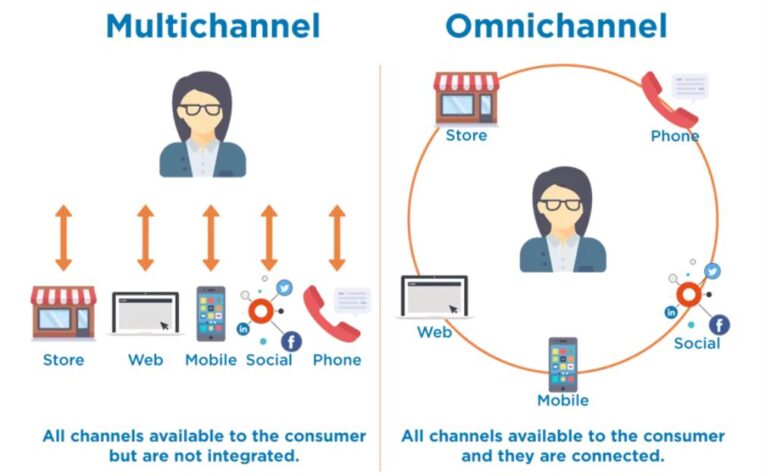what is omni-channel marketing?
- iclick
- 2023-02-27
In today’s digital age, customers are no longer confined to just one channel for interacting with brands. They can interact with businesses on multiple platforms such as websites, social media, mobile apps, and physical stores. With so many touchpoints available, it is becoming increasingly difficult for businesses to provide a seamless experience to customers. That’s why omni-channel marketing is proposed. Then what omni-channel marketing on earth and how does it assist businesses to reach customers successfully? In this article, you can have the opportunity to get know about omi-channel marketing from comprehensive perspectives.
Definition of omni-channel marketing
Omni channel marketing is a strategy that businesses use to provide a seamless and consistent experience for customers across all touchpoints. It involves integrating all the channels that customers use to interact with your brand together in a cohesive way. Those channels integrated under the strategy of omni-channel marketing include official website, mobile app, social media, email, physical store, and any other channel that customers may use. The strategy has become increasingly important in the modern business world, as customers are more likely than ever to switch among different channels when they purchase something they need.
The Benefits of Omni-Channel Marketing
Omni-channel marketing benefits customers and businesses a lot. For customers, it provides a seamless and convenient shopping experience across all channels. Customers can browse products online, choose the one that attract them the most and remember the information about it. Then they can visit the brand’s physical store to try out the product that they selected online previously ,have a real experience of the product,and make a comparison between the platform online and offline before they make a purchasing decision. With the support of omni-channnel marketing strategies, customers can enjoy a consistent experience and make a wiser purchasing choice in the shortest time and at the lowest cost.
For businesses, omni-channel marketing can help to increase sales and improve customer loyalty. By providing customers with a seamless experience across all channels, businesses can establish a good image in customers’ mind, obtain trust from customers, and retain old customers easier. In addition, omni-channel marketing can help businesses to reach more new customers and increase brand awareness by expanding their reach across diverse channels. Nowadays, with the development of information and the popularity of the Internet, more and more customers are accustomed to browsing various platforms and obtaining information from multiple channels. Therefore, Omni-channel marketing strategy is a good opportunity for business to improve brand’s exposure, which is helpful to be remembered by more customers and becomes their potential choice gradually.

How Omni-Channel Marketing Works
Omni-channel marketing involves integrating all channels that a business uses to interact with customers, including online, mobile, in-store, and social media. The goal is to provide a consistent and seamless experience across all these channels so that customers can interact with the brand in the way that suits them best. To reach the goal, businesses need to develop a strategy that covers all touchpoints that a customer might have with their brand. These touchpoints include everything from online advertising, social media marketing to in-store displays and customer service. The core of omni-channel marketing is to use data for a better understanding of customers and their preferences. By tracking customer interactions across all channels, businesses can gain insights into what their customers want and tailor their marketing messages accordingly. For example, a business might use data to identify that a particular customer prefers to browse products online before making a purchase in-store. The business can attract the customer through tailored advertising and offers and ensures that the customer’s in-store experience is consistent with what she saw online. Omni-channel strategies can help business track the journey of customers on all touchpoints in a real-time way, output a database about each customers, and supply a reference for the design of detailed promotion strategies. Eventually, the business can reach a high conversion rate effectively.
Implementation of Omni-Channel Marketing
- Implementation of Omni-channel marketing can be a complex and challenging process, but it is essential for businesses that want to remain competitiveness in the modern marketplace. Here are some steps that businesses can take to implement omni-channel marketing effectively:
- Analyze your customer data: Identify the different touchpoints that customers have with your brand by analyzing your customer data, which includes activities from the browse of brand website, the visit of physical stores to the interaction with brands on social media.
- Develop a strategy: Based on your analysis, develop a strategy that covers all the different touchpoints, which might involves investing in new technologies or marketing channels, such as mobile apps or social media advertising.
- Build a unified customer experience: Create a unified customer experience across all channels so that customers can switch among multiple platforms freely. To provide a consistent experience for customers, the business need use consistent branding and messaging, as well as ensuring that customers can easily access the same products and services across different channels.
- Train your staff: Train your staff to deliver a consistent customer experience across all channels so that customers feel to be supported and valued no matter how they choose to interact with your brand.
- Monitor your results: Use data to monitor your results and identify areas where you need to improve. It might involve tracking customer feedback or using analytical tools to measure the effectiveness of your marketing campaigns.
Conclusion
Omni-channel marketing is an essential strategy for businesses that want to provide a seamless and consistent experience for their customers across all channels. By integrating all the different touchpoints that customers have with their brand, businesses can build trust and encourage repeat purchases, as well as reaching new customers and increasing brand awareness. However, the implementation of omni-channel marketing can be a complex process, requiring careful analysis of customer data, the development of a unified customer experience, and the training of staff to deliver consistent messaging and branding. In today’s highly competitive business environment, it is no longer enough to simply provide good products or services. Customers are looking for a seamless and convenient shopping experience, and businesses that fail to deliver it risk falling behind their competitors. By implementing omni-channel marketing, businesses can meet the expectations of their customers, improve customer loyalty, and promote the growth of conversion.



